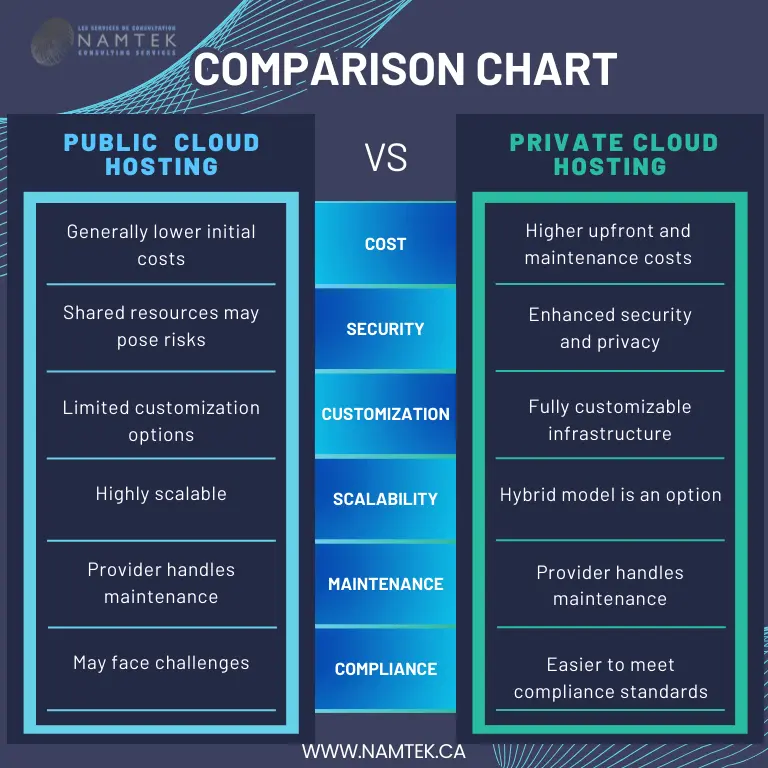Cloud computing has become a key component for companies looking for flexibility, scalability, and creativity in the ever-changing digital workspace.
It might be difficult to sort through the different cloud hosting alternatives, though, especially when choosing between private and public cloud hosting.
Public and Private clouds, each have unique benefits and fits various business requirements; not talking about the difference in implementation cost.
In this article, we will review the main differences between private and public cloud hosting, to assist our readers in making a well-informed decision that supports their company’s objectives.
I will start by writing some refreshers about the definitions of both options, provide a comprehensive list of Pros and Cons, and than talk about the decision-making process.
What is Public Cloud Hosting?
The term “public cloud hosting” describes online services that share resources like servers, storage, and apps with numerous customers.
The goal of public cloud hosting is for the end user to use the resources as required. Although more and more businesses are now reselling and supporting cloud server hosting, the fundamental service is still the same: the end user is responsible for “managing” the cloud resources.
This market is dominated by big suppliers like Google Cloud Platform, Microsoft Azure, and Amazon Web Services (AWS). Because public cloud solutions are mostly offered on a pay-as-you-go basis, companies can adjust resource levels in response to demand, without committing to long-term contracts, even though these providers offer discounts for long-term commitment.

Key Benefits of Public Cloud Hosting
1. Cost-Effectiveness:
Businesses, especially startups and small to medium-sized organizations (SMEs), may find public cloud hosting to be more economical. Pay-as-you-go model allows businesses to only pay for the resources they use, which can result in substantial cost savings.
2. Scalability:
One of the most crucial aspects of public cloud hosting is the capacity to quickly scale resources up or down. This flexibility is crucial for businesses with different workloads because it allows them to respond swiftly to changing demands without having to invest in hardware and software up front.
3. Fast Deployment:
Businesses can quickly launch apps and services thanks to public cloud services, which can be set up in a matter of minutes. This speed can be a big advantage in the competitive market of today.
4. Automatic Updates:
Public cloud providers regularly update their infrastructure and services, ensuring that businesses benefit from the latest technology and security measures without additional effort.
Cons of Public Cloud Hosting
Although public cloud hosting has many benefits, there are some disadvantages as well that companies should consider before choosing. These are a few of the primary drawbacks of using public cloud hosting.
1. Security Concerns
- Shared Environment: Since public cloud resources are shared among multiple clients, there is an increased risk of data breaches and unauthorized access. Sensitive information may be more vulnerable in a multi-tenant environment.
- Limited Control: Businesses have less control over security protocols and configurations, relying on the cloud provider to implement necessary security measures.
2. Compliance Issues
- Regulatory Challenges: When utilizing public cloud services, businesses in regulated sectors (like healthcare or finance) may find it difficult to adhere to industry-specific rules. In a shared setting, maintaining data privacy and compliance can be challenging.
- Requirements for Data Residency: Certain laws mandate that data be kept geographical areas. Compliance with these rules may not always be guaranteed by public cloud providers.
3. Performance Variability
- Resource Contention: Because resources are shared among multiple users, performance can be affected by peak usage times, leading to slower response times or degraded performance for your applications.
- Latency Issues: Depending on the location of the cloud provider’s data centers and the end users, latency can be an issue, particularly for applications that require real-time processing.
4. Limited Customization
- Standardized Solutions: Public cloud hosting often provides standardized services, which may not meet the specific needs of every business. Customization options can be limited compared to private cloud solutions.
- Less Flexibility: Businesses may find it challenging to tailor infrastructure configurations or applications to suit their unique requirements.
5. Downtime Risks
- Provider Outages: Public cloud providers may have outages or downtime that affect all their client’s base. Even though most reliable providers have measures in place to minimize such downtime, businesses that require high availability may still be worried about it and need to spend a considerable amount of money to implement in a public cloud. In 2024, we saw numerous significant disruptions of public cloud services that affected a wide range of businesses worldwide.
READ: The 10 Biggest Cloud Outages Of 2024
6. Overspending
- Unpredictable Costs: Public cloud services may be priced fairly, but unexpected spikes in consumption can lead to unexpectedly high expenses. Businesses may go over budget if sufficient management and control are not in place.
7. Vendor Lock-In
- Dependency on Providers: Migrating from one public cloud provider to another can be complicated and costly, leading to vendor lock-in. Businesses may find themselves dependent on a single provider’s ecosystem, limiting flexibility and choice.
What is Private Cloud Hosting?
Private cloud hosting involves a dedicated cloud environment that is utilized only by one company “privately”. This can be run by a third-party company or hosted on-site. For companies that need more security, compliance, and customization, private clouds are perfect.

Key Benefits of Private Cloud Hosting
1. Improved Security and Privacy:
By storing your data in a specialized environment, a private cloud reduces the possibility of data breaches and unwanted access. This degree of protection is particularly crucial for sectors like government, healthcare, and finance that deal with sensitive data.
2. Greater Control and Customization:
Private cloud hosting enables businesses to modify their apps and infrastructure to suit certain business requirements. Businesses can maximize productivity by optimizing their resources and settings with this degree of personalization.
3. Comprehensive Support Services:
A lot of private cloud providers offer a variety of managed services, including disaster recovery, backup, maintenance, and monitoring. The operational load on internal IT teams is much lessened by this support, freeing them up to concentrate on strategic projects rather than regular maintenance.
4. Compliance and Regulatory Support:
Private cloud hosting can help companies in regulated sectors keep up with rules and industry standards. To streamline the process for customers, providers frequently include compliance measures in their offerings.
Cons of Private Cloud Hosting
Private cloud hosting has its own set of disadvantages even if it provides several advantages, such as increased security and customisation. Some of the primary drawbacks of private cloud hosting are as follows:
1. Initial Investment
To put together a private cloud for hosting, most of the times, service providers need to purchase hardware, software, and infrastructure. These hardware initial investments and their respective expenses are normally paid up front and included in the cost of the onboarding of their clients. Small and medium-sized firms may find this kind of upfront investment a fee they cannot afford.
2. Ongoing Costs of Maintenance
Service providers managing private clouds to host their clients’ platform, need to keep in mind an ongoing budget for hardware replacement and upgrade every few years, they also need to consider a budget for ongoing maintenance.
3. Resource Management
Service providers managing private cloud for hosting, need a dedicated IT team with sharp IT skills, and specialized in several areas of hardware, software implementation to maintain security and compliance of the cloud infrastructure, which can strain company’s resources.
4. Increased Responsibility
While private clouds offer enhanced security, the organization is responsible for ensuring compliance with industry regulations and maintaining security protocols. This can require dedicated resources and continuous oversight.
Public vs. Private Cloud Hosting: A Comparison
Following is a summary table highlighting the major differences between public and private cloud hosting for enterprises. Text identified in green identifies the winner option. Certainly, there are other features to look for, but I opted to emphasize the top 5 features in this comparison table.
| Feature | Public Cloud Hosting | Private Cloud Hosting |
| Cost | Generally lower initial costs | Higher upfront and maintenance costs |
| Security | Shared resources may pose risks | Enhanced security and privacy |
| Customization | Limited customization options | Fully customizable infrastructure |
| Scalability | Highly scalable | Hybrid model is an option |
| Maintenance | Provider handles maintenance | Provider handles maintenance |
| Compliance | May face challenges | Easier to meet compliance standards |

FAQ: Which Cloud Hosting is Right for Your Business?
What is the main difference between public and private cloud hosting?
The main difference lies in resource sharing. Public cloud hosting shares resources among multiple clients, while private cloud hosting is dedicated to a single organization.
How do I decide between public and private cloud hosting?
Consider factors like your budget, security needs, compliance requirements, and scalability demands. Public clouds suit smaller budgets and general workloads, while private clouds are ideal for industries with stringent regulations or sensitive data.
What industries benefit most from private cloud hosting?
Industries like healthcare, finance, and government, where data security and compliance are critical, benefit significantly from private cloud hosting.
Can businesses combine public and private clouds?
Yes, businesses can use a hybrid cloud model, combining public and private clouds to balance cost, scalability, and security based on specific needs.
What industries benefit most from private cloud hosting?
Industries with stringent compliance and security requirements, such as healthcare, finance, and government, often benefit most from private cloud hosting.
Is public cloud hosting secure enough for sensitive data?
Public cloud hosting providers implement robust security measures, but the shared nature of the environment may not meet the needs of businesses handling highly sensitive data.
Can public cloud hosting ensure data compliance?
Public cloud providers offer tools and configurations to support compliance, but businesses must ensure proper implementation to meet regulatory requirements.
What are hybrid cloud solutions?
Hybrid clouds combine public and private cloud features, allowing businesses to balance flexibility and security based on their needs.
What is the difference in cost structure between public and private cloud hosting?
Public clouds typically use a pay-as-you-go model, minimizing initial costs. Private clouds require higher upfront investment but may offer long-term savings for businesses with specific needs.
How can Namtek Consulting Services help with cloud hosting decisions?
Namtek Consulting Services offers expert guidance and tailored solutions, helping businesses choose and implement the best cloud hosting option for their unique requirements.
Are private clouds scalable?
Yes, private clouds can be scalable, especially when paired with a hybrid model. However, scalability often involves higher costs and resources compared to public clouds.
How can businesses control costs in public cloud hosting?
Effective cost management tools, monitoring, and setting resource usage limits can help businesses avoid overspending.

Namtek Consulting Services Expertise in Private Cloud Hosting
Choosing the right private cloud service provider is a key factor in making sure your business succeeds in its journey to the cloud.
The service provider you pick has a big impact on how smoothly things go, from implementing and migrating your infrastructure to managing the resources and supporting your end-users. That’s where Namtek Consulting Services comes in. With more than 25 years of experience in IT consulting and private cloud hosting, we know how important it is to work with a trusted IT partner.
We can help you migrate your infrastructure to our private cloud, or even create one from scratch. When you work with our team at Namtek, you can be sure you’re getting a service that fits within your expectations, and that will be implemented on time and within budget. We can help your company in all the steps of the project with a transparent mechanism and no surprises.


 There are so many IT terms that are flying around every where nowadays that it’s difficult to know which ones are important for a business’ success and which ones are simply short-term fads. After doing the research and dealing with businesses on a daily basis to help improve their IT infrastructures and business processes, we can safely say that the top 4 forces reshaping enterprises for the better are as follows
There are so many IT terms that are flying around every where nowadays that it’s difficult to know which ones are important for a business’ success and which ones are simply short-term fads. After doing the research and dealing with businesses on a daily basis to help improve their IT infrastructures and business processes, we can safely say that the top 4 forces reshaping enterprises for the better are as follows  IT consultants and developers throw around tons of IT terms that many business executives don’t fully understand. It’s quite common to hear the terms cloud and SaaS (Software as a Service). However, what’s the difference between these two IT terms? Many non-IT people seem to confuse Software as a Service and cloud computing, which is understandable as these terms are linked.
IT consultants and developers throw around tons of IT terms that many business executives don’t fully understand. It’s quite common to hear the terms cloud and SaaS (Software as a Service). However, what’s the difference between these two IT terms? Many non-IT people seem to confuse Software as a Service and cloud computing, which is understandable as these terms are linked.  I’m sure we’ve all wondered how nice it would be to work from home. No trudging to work in cramped spaces on public transit or in blizzards or being stuck in bumper-to-bumper traffic. In recent years however, this dream has quickly become a reality.
I’m sure we’ve all wondered how nice it would be to work from home. No trudging to work in cramped spaces on public transit or in blizzards or being stuck in bumper-to-bumper traffic. In recent years however, this dream has quickly become a reality.